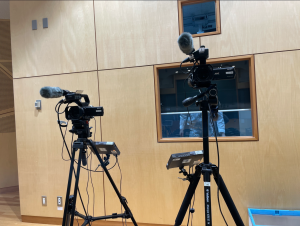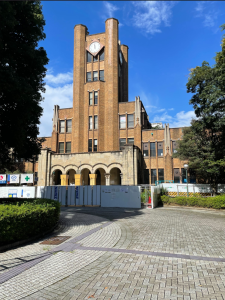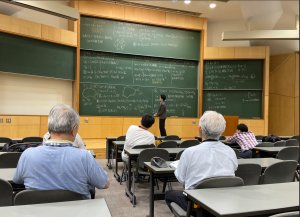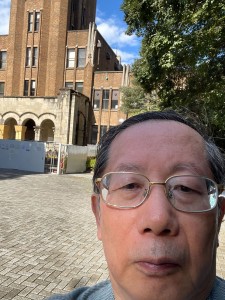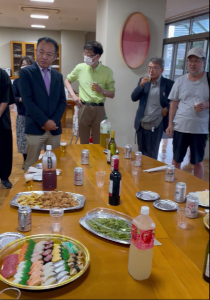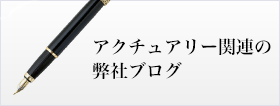東京大学数学科の同窓会が東大駒場で開催されました
2024年10月23日
2024年10月19日(土)に、東京大学数学科の同窓会が東大駒場で開催され、昨年に引き続き、私も参加しました。
まず最初に大講堂で特別講演が行われ、その後、数理科学研究所などのコモンルームで懇親会が開かれました。参加者も多く、非常に盛況だったと思います。
久しぶりに東大で講義を聞き、巨大なホワイトボードや黒板にチョークで数式を書いていく様子を見て、40年ほど前に数学科で学んでいた頃を思い出しました。 時が経ちましたが、東大数学科は今も健在で、多くの優秀な数学者を輩出しています。
また、同期の楠岡東大名誉教授も昨年に続き参加され、少しお話しする機会がありました。
楠岡教授は、日本における数理ファイナンスの第一人者であり、東大のアクチュアリーサイエンスプログラムの推進にも大きな役割を果たされた方です。 私も非常勤講師として、リズム科でアクチュアリーに関する講義を担当した経験があります。
お互い年を取りましたが、こうして数学の世界で話ができることを非常にありがたく思っています。
懇親会では、他の先生方やアクチュアリーのコンサルタント、博士課程の学生とも話をしました。ただ、少し気になったのは、東大数学科からアクチュアリーの道に進む人が減ってきているという印象を受けたことです。
東大の数学科の学生がアクチュアリーの道を目指す数が減少している背景には、いくつかの要因が考えられます。 最も大きな要因は、楠岡教授の定年退職により、アクチュアリーサイエンスの講座が事実上消滅してしまったことだと思います。
楠岡教授の人脈を通じて、多方面からアクチュアリー業界の実務者に講義を依頼していたのですが、その道が閉ざされ、数理科学研究所内でもアクチュアリー関連の講座がなくなった結果、アクチュアリーという職業自体を知らない学生が増えてしまったのではないかと感じます。
それでも懇親会では、毎年少数ながらアクチュアリー業界に進む人がいるという話を耳にしました。
しかし、本来であれば東大ブランドを持つ学生が、日本生命や第一生命といったトップ企業、またPWCやEYといったトップクラスのコンサル会社、あるいはプルデンシャルやメットライフなどの外資系企業に就職するのが自然なはずですが、意外と中小の保険会社に入社しているようです。これは、適切なキャリアアドバイスを提供する体制が整っていないことに起因していると思います。
私の東京国際アクチュアリーアカデミーでもインターンシップ生たちと就職活動や転職の話をしますが、しっかりとしたアドバイザーがいないと、東大の卒業生でも就職活動で苦戦することがあります。
また、学問に没頭しすぎて「専門バカ」になったとまでは言いませんが、数学に集中する学生は、ビジネスで必要なコミュニケーション力が不足していると見なされるという、妙な噂が立っているのも事実で、これは非常にもったいないことです。
私が1976年に卒業した当時も、1学年50名ほどの数学科生の中で5名程度がアクチュアリーとして保険業界に進みましたが、コミュニケーション力の不足を理由に落とされたという話は聞いたことがありませんでした。
当時と比べて、就職活動は非常に競争が激しく、かなりの時間を割かないと失敗してしまうこともあり得ます。 最近では「学知家」という言葉も聞かれるようになりましたが、当時はそういった概念はありませんでした。
東大の学生といえども、他の大学と差別化されることなく、学力的にはトップクラスであっても、他の大学の学生と同様に、インターンシップや面談に多くの時間を費やさなければ、トップ企業から内定を得ることが難しいのかもしれません。
また、言葉遣いも問題です。最近の大学生は、敬語を正しく使えないことが多く、上司や年上の人に「分かりました」といった表現を使うことがあります。 正確には「かしこまりました」や「承知しました」といった表現が適切ですが、そういった教育を受ける機会が少ないようです。
さらに、面接時に髪が乱れていたり、髪を奇抜な色に染めていたりと、自由な大学生活では許されることも、ビジネスの世界では好まれません。 そのような外見が原因で、人事に悪い印象を与えてしまうことがあるようです。
ですので、ぜひ我々の転職サポートや就職活動サポートを利用して、ビジネスマナーや外見の訓練を受けていただきたいと思います。
最後までお読みいただき、ありがとうございました。
代表取締役社長 吉田 英幸
Yesterday, on Saturday, October 19, 2024, the alumni reunion of the Mathematics Department of the University of Tokyo was held at the Komaba campus. I participated again this year, just as I did last year.
The event began with a special lecture in the main hall, followed by a reception held in the common room of the Institute of Mathematical Sciences. It was quite a successful event with many participants.
Listening to a lecture at the University of Tokyo for the first time in a while reminded me of my time studying in the Mathematics Department, about 40 years ago, when large whiteboards and blackboards were filled with chalked equations.
Despite the passage of time, the Mathematics Department of the University of Tokyo remains strong, producing many excellent mathematicians.
Professor Emeritus Kusuoka, one of my contemporaries, also attended again this year, and I had a brief conversation with him. As you may know, Professor Kusuoka is one of Japan’s leading scholars in the field of mathematical finance and played a significant role in promoting the Actuarial Science Program at the University of Tokyo. I have also had the opportunity to lecture part-time on actuarial science in the Department of Mathematics.
Though we have both aged, I am very grateful that we can still talk about the world of mathematics together.
During the reception, I had conversations with various professors, actuarial consultants, and Ph.D. students.
While that was enjoyable, I noticed something concerning: it seems that fewer students from the Mathematics Department at the University of Tokyo are pursuing careers as actuaries.
Certainly! Here is the English translation:
It seems that the decline in the number of students from the University of Tokyo’s Mathematics Department pursuing actuarial careers can be attributed to several factors.
The most significant reason, I believe, is the retirement of Professor Kusuoka, which led to the effective discontinuation of the actuarial science courses.
Professor Kusuoka had leveraged his personal network to invite practitioners from various areas of the actuarial industry to lecture, but with his departure, that pathway has been closed, and the actuarial courses in the Institute of Mathematical Sciences have been discontinued.
<>pAs a result, more students are unaware of the actuarial profession.That being said, I heard during the reunion that a few students still enter the actuarial industry each year.
However, it would be natural for students with the University of Tokyo’s brand to join top companies such as Nippon Life, Daido Life, or leading consulting firms like PwC and EY, or even multinational firms like Prudential and MetLife.
Yet, I noticed that some are joining smaller insurance companies.
I believe this stems from the lack of a proper system for providing career advice.
At my Tokyo International Actuary Academy, we often discuss job hunting and career changes with interns, and even University of Tokyo graduates can struggle in job searches without proper advisors.
I’ve also heard that some students become overly focused on their studies, and while it’s extreme to call them “narrow-minded specialists,” there’s a strange rumor that students with a mathematical mindset are often viewed as lacking the communication skills necessary for business.
This is truly a missed opportunity. When I graduated in 1976, although it was quite a while ago, about five students out of a class of 50 in the Mathematics Department went on to join the insurance industry as actuaries.
There was never any talk of someone being rejected due to poor communication skills.
Compared to back then, the job hunting process has become much more competitive, and it’s not surprising that those who don’t dedicate enough time to it might fall behind and struggle.
Terms like “academic intelligence” didn’t exist back then, and even University of Tokyo students, though top-ranked in terms of academic ability, were not differentiated from students from other universities.
Without spending a lot of time on internships and interviews like others, they might not receive offers from top companies.
Additionally, there’s the issue of language etiquette. Recently, more university students fail to use polite expressions properly, saying things like “I understand” to superiors or older individuals, when they should say “I will comply” or “I acknowledge.”
They aren’t taught these things. Furthermore, students attending interviews with disheveled hair or dyed in strange colors may be acceptable in the free academic environment of universities, but such appearances can negatively affect their chances in the business world.
I suspect these issues are leading to their failures in job hunting.
Therefore, I highly recommend that students make use of our career support services to receive proper training in business etiquette and grooming. Thank you very much.
Here’s the English translation:
Another reason for the decline in the number of aspiring actuaries is that students who have studied advanced mathematics often don’t fully understand what an actuary’s work entails, whether it is exciting, and how their skills can be applied in business. This lack of understanding is a significant factor.
To address this, I previously created a video titled “M&A and Actuaries.”
During my time at PwC, I worked on many projects, but the one that I found most rewarding, and that generated the most revenue, was M&A (mergers and acquisitions).
Actuaries play a key role in generating profits from such projects, and this is reflected in their bonuses, which makes the work particularly attractive.
I created a video that portrays the image of M&A work, combining both fiction and non-fiction elements.
I would like to attach a simplified version of this video here.
I hope that by watching it, more talented individuals with strong mathematical abilities will see how exciting and rewarding a career as an actuary can be, and aspire to become actuaries themselves.
